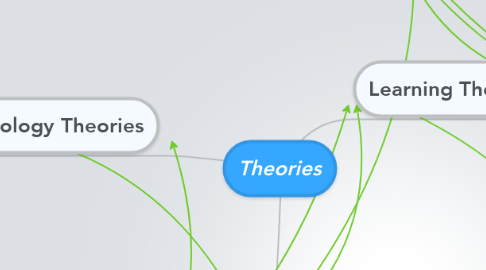Theories
by Matthew Whitman

1. Connectivism: Knowledge exists in networks created with external sources (people, resources and groups). Postmodern approach: learning and knowledge exist in the diversity of opinions. Learning for the digital age, digital learners, learning how to access knowledge sources is more important than knowledge itself. Currency, and the capacity to learn more is more critical than current knowledge. The ability to recognise connections between fields, ideas and concepts is the most vital skill. Teachers should facilitate the group building a learning network which is ever evolving and updating. -MOOC, Twitter, Google search (search engines)
2. Technology Theories
3. Cognitivism: Active networks constructed within the mind. New knowledge is constructed upon prior knowledge. Memory is organised. Schema, habitus and scaffolding. Notion of linear progress in building knowledge (seriality) Cognitive Load: The notion that the mind can only build new knowledge at a certain rate. That there can occur over-stimulation and thus chunking should be applied. -Prezi, mindmaps, virtual tours (Scaffolding)
4. Constructivism: The notion that learning is constructed as links within the mind are built like a network. It promotes problem solving (non-linear), projects, authentic tasks and collaboration. Teachers are to teach just ahead of student's knowledge (Zone of Proximal Development) and to facilitate self-learning. Learners must apply theory in the field, as creative experiences and dynamic real-world activities allow for learning to take place. -Collaborative role-playing games, Lego Robotics, Google docs/sites
5. Behaviouralism: Modelling, Shaping, Cuing & Conditioning. Based on a set of universalist techniques that if applied should allow for the generation of behavioural hegemony in the classroom. Based on a structural foundation that there exists definitively 'good' behaviours that are conducive to learning and that there are absolute techniques that if applied correctly will result in measurable and precisely determined behavioural outcomes. -Reader rabbit, iclickers, Ted Talks
6. Media Ecology - Ecological Approach: A notion that media (in its many forms) shape understanding, form knowledge and implicitly construct the manner in which people learn and perceive. It is linked with the seminal 'the medium is the message' idea, and it impacts learners in that the medium in which they are taught, and the media/digital stimuluses of their world, together structure their perception and way they in which understand the world and themselves.
7. Social Construction of Technology (SCOT): A notion that argues against the premisses of Mcluhen's Media Ecology in that it asserts that technology is not a determinate factor in human agency and that is in fact humanity, individual and collective, that shape technology. Rather than media or digital stimuluses structuring human perception, habitus and action, SCOT argues that like all social constructs, technology and the media are in fact constructed by humanity and shaped by its needs. An example of this is apps and interfaces dominating the tech sector, as these are two technological needs that society has placed a premium on.
8. Learning Theories
9. Philosophy of Technology: The seamless alignment of Technology and Teaching Theories in the 21st Century classroom.
10. TPACK: Technology Pedagogy Content Knowledge - Interaction and intersection of the three primary forms of knowledge: Content (CK), Pedagogy (PK), and Technology (TK). understanding and negotiating the relationships between these three components of knowledge. The negotiation of these relationships – of the liminally dynamic relationship of the three components - represents the most important form of knowledge. The notion that technology cannot be seen as isolated from (or within) learning and that effective teaching requires an understanding of how technology relates to the pedagogy and content.


